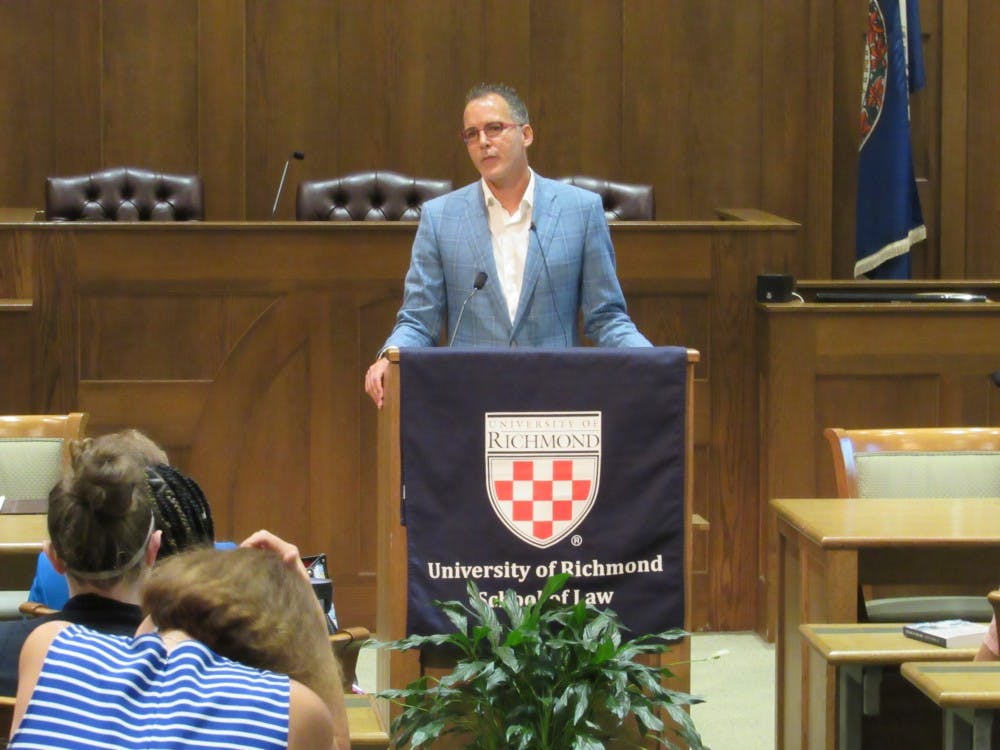Pulitzer Prize-winning author and Yale Law School professor James Forman Jr. argued in a Thursday lecture that our current criminal justice system has its roots in racist and misguided law enforcement policies that can be traced back generations.
“I’m not exactly sure the system deserves the word ‘justice’ in the title,” Forman said, decrying what he described as the systematic incarceration of black men in the U.S. at elevated levels compared with their white counterparts.
180 people registered to attend Forman’s lecture on criminal justice reform, which took place at the T.C. Williams School of Law. The audience was composed primarily of law school faculty members and students, as well as educators and activists from the greater Richmond community.
The University of Richmond was one of three schools nationally selected to host Forman, the 2019 Order of the Coif Distinguished Visitor, said Emily Cherry, assistant dean for communications and strategic initiatives for the law school.
In his speech, Forman spoke at length about the issue of mass incarceration, building off the topics he covers in his book, “Locking Up Our Own: Crime and Punishment in Black America.”
Forman described the fight against mass incarceration as the civil rights struggle of our generation, and outlined the need for criminal justice reform.
Forman stressed the underlying influence of racism in the creation and maintenance of the current criminal legal system today and described his book as fundamentally about the black community and its interaction with that system.
For example, he framed the initial increase of policing in the black community as a result of the historic unresponsiveness of the law during the Jim Crow era, which led to black lawmakers post-Reconstruction taking it upon themselves to ensure a greater responsiveness to their constituents’ needs.
“[They] all remember the long history of under-enforcement and under-protection of the law that had been part of the black experience in this country since the original under-protection of the law, which was slavery,” Forman told attendees.
But because of the lack of black representation in national politics, those same lawmakers found themselves without additional tools to improve their communities.
Forman recounted how local black officials would go to Congress with an “all-of-the-above” strategy, asking for increased funding for law enforcement but also for matters such as jobs programs and housing reforms.
However, they would inevitably return with what Forman described as a “one-of-the-above” solution: more funding for law enforcement.
Enjoy what you're reading?
Signup for our newsletter
Forman’s speech aimed not just to identify the disease, but also to prescribe a cure, one that the next generation of activists here at UR can implement.
“This problem I’m describing is fundamentally a state and local problem,” Forman said. “Eighty-eight percent of people who are imprisoned in this country are in a prison in a state, county or local facility.”
If you’re passionate about mandatory minimum sentencing reform, run for the state legislature, he said. If you care about the school-to-prison pipeline, work to get on your local school board.
Mary Kelly Tate, director of the Institute for Actual Innocence and a professor at the law school, was in attendance for the talk and found the content of Forman’s speech to be especially moving.
“He has encountered this set of challenges as a professional and as a writer in a way that is just incredibly compelling,” Tate said. “I thought Professor Forman brought a richness and a depth to this highly, highly important area of social and political and economic reality in the U.S.”
In addition to his lecture, Forman had a private conversation with faculty members who were involved in prison reform initiatives as well as with members of law school organizations such as the Criminal Law Society and the Student Bar Association Diversity and Inclusion Committee.
Contact contributor Aquila Maliyekkal at aquila.maliyekkal@richmond.edu.
Support independent student media
You can make a tax-deductible donation by clicking the button below, which takes you to our secure PayPal account. The page is set up to receive contributions in whatever amount you designate. We look forward to using the money we raise to further our mission of providing honest and accurate information to students, faculty, staff, alumni and others in the general public.
Donate Now



